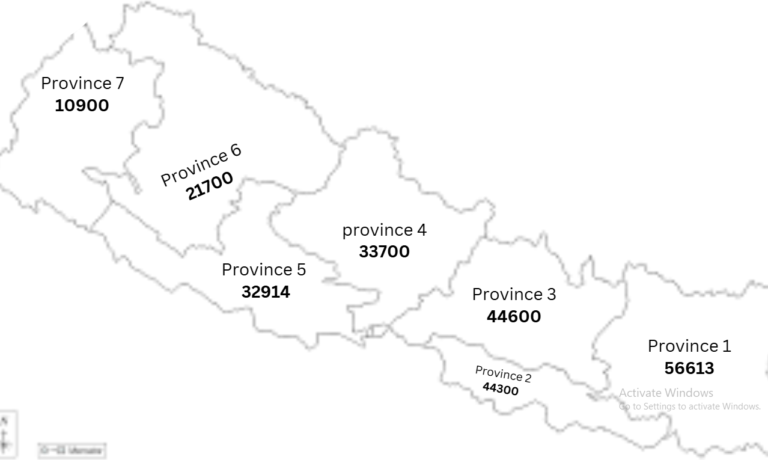BSc Mathematics : Scope, Colleges, Syllabus, Fees & Career Opportunities
Introduction to BSc Mathematics


Mathematics has always been considered the language of logic, structure, and precision. If you’re someone who loves solving problems, decoding patterns, or diving into the realm of abstract reasoning, then a Bachelor of Science in Mathematics (BSc Mathematics) could be your perfect academic path. In Nepal, this undergraduate program is gaining increasing attention from both students and educational institutions. But why is that?
A BSc in Mathematics is typically a three to four-year undergraduate degree that offers a comprehensive understanding of algebra, calculus, geometry, statistics, and theoretical as well as applied mathematics. This program is more than just numbers and formulas; it trains your brain to think critically, solve complex problems, and approach challenges in an analytical way.
Whether it’s artificial intelligence, economics, physics, engineering, or even social sciences, mathematics forms the backbone of all modern disciplines. It’s no surprise that more students are opting for math over traditional science courses.
Moreover, the course is designed to not only provide theoretical knowledge but also develop the technical and computational skills needed in modern industries. With Nepal gradually catching up in the global digital and tech race, math graduates are finding more doors opening than ever before.
So, whether your ambition lies in becoming a data scientist, a financial analyst, a teacher, or a researcher, BSc Mathematics offers the perfect foundation to build on.
Why Study BSc Mathematics?
Still wondering if pursuing BSc Mathematics in Nepal is the right decision? Let’s unpack the reasons why this could be a smart move.
Rising Interest in STEM
STEM (Science, Technology, Engineering, and Mathematics) has seen a significant push in Nepal over the last decade. With the government, NGOs, and educational institutions promoting STEM for national development, mathematics has naturally become a subject of priority. Campaigns promoting science education and scholarships for talented students have encouraged youth to take mathematics seriously.
Availability of Reputed Institutions
Nepal is home to universities like Tribhuvan University and Kathmandu University that offer robust mathematics programs. Their curricula are regularly updated to align with global standards. These institutions also bring in visiting faculties, host academic seminars, and encourage interdisciplinary research—making the experience richer and more relevant.
Cost-Effectiveness Compared to Abroad
Studying mathematics abroad is expensive. But here’s the deal—BSc Mathematics is far more affordable and still provides a competitive education. Tuition fees, living costs, and academic materials are well within reach for most middle-income families. Add to that the availability of government and private scholarships, and you’ve got a winning combination.
Local Relevance, Global Opportunities
Another overlooked advantage is the local curriculum tailored to Nepal’s socio-economic context. Students can apply mathematical theories to solve real-world problems in Nepal—be it in agriculture, climate modeling, finance, or even development policy. At the same time, the course is strong enough to make you eligible for postgraduate programs abroad.
Eligibility Criteria for BSc Mathematics
Before you dive into application forms and start dreaming of lectures on real analysis, it’s crucial to know if you qualify.
Academic Requirements
To enroll in a BSc Mathematics program in Nepal, you must have completed your 10+2 level (or equivalent) in the science stream. Most universities require students to have taken mathematics as one of their main subjects. Here’s a typical requirement:
- Minimum Grade: Generally, students need a minimum of a “C” grade in each subject with an overall GPA of 2.0 or higher.
- Subject Focus: You must have studied Mathematics in Grade 11 and 12.
Entrance Exams and Merit System
Some universities like Tribhuvan University conduct an entrance examination for admissions into their BSc programs. The test typically includes questions on:
- Algebra and Geometry
- Calculus
- Trigonometry
- Probability and Statistics
- General Mathematics Knowledge
Private colleges may also follow a merit-based admission system. In many cases, your SEE and +2 marks carry weightage along with the entrance test scores.
So, if you’re planning to get into a top college, it’s wise to start preparing early. The competition is increasing every year, especially in urban centers like Kathmandu, Pokhara, and Lalitpur.
Top Universities and Colleges Offering BSc Mathematics
Choosing the right institution is a game-changer. You want a place that not only teaches you the subject but inspires you to pursue a career in it.
Tribhuvan University (TU)
TU is the oldest and most prominent public university in Nepal. Its Central Department of Mathematics offers a well-rounded BSc Mathematics program. The syllabus here is aligned with both theoretical and applied aspects of math. TU-affiliated colleges are found all over the country, so accessibility is not an issue.
Kathmandu University (KU)
KU is known for its modern infrastructure and progressive curriculum. Although slightly more expensive than public universities, its approach to teaching, research opportunities, and experienced faculty makes it a preferred choice for many urban students.
Pokhara University (PU)
PU offers BSc programs through its affiliated colleges. Its course structure is practical-oriented, with a focus on statistics, computer applications, and mathematics in engineering.
Purbanchal University
This university is expanding its reach and quality rapidly. Its curriculum balances theoretical math with real-world applications. The BSc programs here often include interdisciplinary learning modules.
Other Notable Private Colleges
- St. Xavier’s College
- Amrit Science Campus (ASCOL)
- Prime College
- Patan Multiple Campus
- Thames International College
Each of these colleges has strengths—some emphasize research, others provide excellent industry connections.
Key Subjects and Practical Papers
Students engage in both theoretical classes and practical sessions. Practical subjects often include:
- Mathematical software training (MATLAB, R, Python)
- Statistical modeling
- Computational mathematics
Some universities also encourage interdisciplinary projects with computer science or physics departments.
Teaching Methodology
- Lectures
- Group Discussions
- Seminars and Workshops
- Research Papers
This holistic approach ensures students don’t just learn math but live it.
6. Fee Structure of BSc Mathematics
One of the most appealing aspects of pursuing a BSc in Mathematics in Nepal is the affordability. Compared to foreign universities, studying in Nepal is incredibly cost-effective without compromising much on the quality of education. However, fees vary depending on whether you’re attending a public or private institution.
Public Colleges and Universities
Public universities like Tribhuvan University (TU) and its affiliated campuses offer the most economical options. Here’s a general breakdown:
- Annual Tuition Fees: NPR 10,000 to NPR 25,000
- Total Program Cost (3 or 4 years): NPR 30,000 to NPR 80,000
These figures do not include costs for books, stationary, lab fees, or exam charges, which may range from NPR 3,000 to NPR 7,000 per year.
Private Colleges
Private colleges, especially those located in urban areas like Kathmandu, may charge significantly more, but they often provide better facilities, smaller class sizes, and international faculty members.
- Annual Tuition Fees: NPR 60,000 to NPR 120,000
- Total Program Cost: NPR 180,000 to NPR 400,000
Some colleges offer payment plans to reduce the burden of lump sum payments.
Scholarships and Financial Aid
Most universities and colleges in Nepal provide scholarships based on:
- Academic merit
- Entrance exam performance
- Economic background (need-based)
- Reserved quotas (for minorities, women, etc.)
Students may also apply for government-provided scholarships, especially those from rural or underprivileged backgrounds. NGOs and INGOs occasionally provide support for high-performing math students.
Hidden and Miscellaneous Costs
Students should also factor in:
- Hostel/Accommodation: NPR 3,000–7,000 per month (outside Kathmandu may be cheaper)
- Books and Materials: NPR 2,000–5,000 annually
- Transportation: Especially for daily commuters in big cities
All things considered, BSc Mathematics remains a highly affordable academic option for Nepali students with immense value in return.
Career Scope After BSc Mathematics
Let’s bust a myth: studying mathematics doesn’t limit you to becoming a teacher. While academia is a popular path, BSc Mathematics opens up an exciting world of career opportunities across various sectors in Nepal and globally.
Teaching and Academia
This is a traditional and respected path. With a BSc degree, you can:
- Teach mathematics at secondary and high school levels.
- Prepare for M.Ed. or B.Ed. to qualify for higher teaching posts.
- Become a lecturer at colleges after completing MSc Mathematics.
With Nepal’s growing emphasis on STEM education, qualified math teachers are always in demand, especially in rural schools where math teachers are scarce.
Government Sector Jobs
Graduates in mathematics are eligible to apply for numerous competitive government jobs such as:
- Lok Sewa Aayog (Public Service Commission)
- Statistical Officers
- Planning and Development Roles
- Finance Ministry Departments
Mathematics is a powerful asset in civil service exams, particularly in logic, statistics, and analytical reasoning sections.
Banking and Financial Sector
Many banks, insurance companies, and microfinance institutions hire math graduates for:
- Data analysis
- Risk assessment
- Loan processing
- Investment analysis
Mathematical precision is vital in banking, and professionals with analytical skills are highly valued.
Data Science and IT Sector
If you’re into tech, a BSc in Mathematics is a great stepping stone to roles like:
- Data Analyst
- Machine Learning Engineer
- Business Intelligence Analyst
- Software Tester
- Cryptography Expert
Learning programming alongside math (Python, R, SQL) can make you even more attractive to IT companies in Nepal and abroad.
NGOs and Research Organizations
International NGOs (like UNDP, World Bank) and local think tanks value math graduates for:
- Policy modeling
- Statistical surveys
- Quantitative research
- Impact evaluation studies
These roles often offer higher salaries and opportunities to travel or work internationally.
Entrepreneurship
Surprised? Math grads make great entrepreneurs. From edtech startups to fintech innovations, mathematical thinking helps in:
- Designing models
- Analyzing trends
- Managing finances
Higher Studies After BSc Mathematics
Graduating with a BSc in Mathematics doesn’t mean your academic journey ends there. In fact, it’s just the beginning for many students who want to specialize or move into interdisciplinary fields.
MSc Mathematics
Several universities in Nepal offer MSc programs in Mathematics. This postgraduate course usually spans two years and dives deeper into:
- Advanced Calculus
- Functional Analysis
- Topology
- Number Theory
- Mathematical Modeling
Completing an MSc qualifies you for teaching positions at the university level, research roles, and high-level government or corporate jobs.
Going Abroad for Higher Studies
If you’re aiming for international exposure, a BSc in Mathematics from Nepal is well-respected in universities across:
- India (IITs, IISc, DU)
- UK (Oxford, Cambridge, Imperial)
- USA (MIT, Stanford, Harvard)
- Australia (ANU, Melbourne)
- Canada (Toronto, UBC)
You can pursue:
- MSc in Applied Mathematics
- MSc in Statistics
- MSc in Data Science
- Actuarial Science
- Mathematical Finance
To boost your chances, prepare for standardized tests like GRE, TOEFL, or IELTS.
Specialized Fields You Can Enter
- Actuarial Science: Great for high-paying jobs in insurance and finance.
- Data Science and AI: Combine your math with coding to enter tech careers.
- Econometrics: Ideal for those interested in economics and statistics.
- Computational Mathematics: Useful in simulations, cryptography, and modeling.
Many students also combine their math background with MBA programs to step into management roles.
Job Market Trends for Math Graduates
The job market in Nepal is evolving rapidly. With the rise of digital technologies and data-driven industries, math graduates are finding new career paths that didn’t exist a decade ago.
Growing Demand in Data-Driven Roles
From banks to tech startups, organizations now rely on:
- Data Analysts
- Financial Modelers
- Quantitative Analysts
- AI Engineers
Companies like Leapfrog, Fusemachines, and Deerwalk are examples of Nepali firms actively hiring math-savvy graduates.
Integration with Technology
Mathematics is no longer just paper and pen. Employers seek professionals who can blend theoretical knowledge with practical software tools like:
- Python
- R
- MATLAB
- Excel Advanced Functions
- Power BI
Universities are also starting to offer electives or certifications to match this trend.
Government Initiatives and Policy Jobs
With increased attention on evidence-based policy-making, the government is hiring more statisticians and analysts. Think tanks like Samriddhi Foundation or IIDS value math graduates for research work.
Freelancing and Remote Work
Thanks to platforms like Upwork and Fiverr, math graduates now work as:
- Online tutors
- Academic writers
- Statistical consultants
This flexibility allows you to work globally while staying in Nepal.
Internships and Research Opportunities
Internships bridge the gap between academic knowledge and real-world experience. Unfortunately, structured internship programs in mathematics are still limited in Nepal—but they are growing.
College-Based Programs
Some top colleges under TU, KU, and Pokhara University offer final-year research projects. These include:
- Statistical analysis on socio-economic data
- Research in pure mathematics topics
- Computational projects involving Python or MATLAB
Students are guided by faculty mentors and sometimes publish papers in academic journals.
Collaborations with NGOs and Research Labs
Many NGOs and development organizations look for interns who can:
- Handle survey data
- Build predictive models
- Perform trend analysis
For example:
- ICIMOD (International Centre for Integrated Mountain Development)
- NCCR (Swiss-funded research on climate change)
- UNDP and USAID-funded statistical projects
Interns here gain valuable exposure and often secure full-time roles after graduation.
International Opportunities
Bright students can apply for international summer programs like:
- DAAD (Germany)
- MITACS (Canada)
- IAESTE Internships
- Asian Science Camp
These programs expose students to cutting-edge research and build strong global networks.
Challenges in Pursuing Mathematics
While there are countless benefits to studying mathematics in Nepal, it’s also important to acknowledge the challenges students often face. Recognizing these hurdles can help students better prepare and policymakers improve academic environments.
Lack of Research Facilities
One of the most glaring issues is the absence of advanced research labs and mathematical research centers in Nepal. While some institutions have limited resources for research in pure and applied mathematics, many colleges still focus heavily on theory without encouraging innovation or experimentation.
- Most math departments lack access to modern software tools like Mathematica, RStudio, or even adequate computer labs.
- There’s limited exposure to real-world applications through simulations or mathematical modeling software.
This gap hinders students who want to move into research-based roles or apply for international post-graduate programs that emphasize research background.
Outdated Curriculum in Some Colleges
Although top institutions like TU and KU update their curriculum periodically, some affiliated or rural colleges still teach outdated syllabi. This creates a significant gap between global industry demands and classroom teachings.
- Courses may lack contemporary topics like data science, cryptography, or machine learning.
- Some institutions don’t offer elective flexibility, forcing students into rigid learning paths.
Brain Drain and Talent Migration
Many of Nepal’s brightest students leave the country after completing their BSc to pursue MSc or PhD abroad. Why? Limited opportunities, low salaries, and lack of mentorship in Nepal often push them to seek better prospects overseas.
This migration, while beneficial for individual growth, results in a domestic shortage of skilled mathematics professionals who could contribute to national development.
Job Market Limitations
While opportunities are growing, the Nepali job market still has limited structured roles specifically for math graduates. You’ll often need to tailor your skills (like learning programming, analytics, or management) to secure a job.
Also, job preference is often given to candidates with experience or postgraduate degrees, leaving fresh BSc graduates with few direct-entry roles.
Language and Communication Barriers
Math may be a universal language, but communicating complex ideas is a challenge, especially in a bilingual setting like Nepal. Students often struggle with presenting papers, writing research reports, or publishing academic articles due to poor English communication skills.
How to Prepare for BSc Mathematics Admissions?
If you’re planning to pursue BSc Mathematics, especially at top universities like Tribhuvan or Kathmandu University, the preparation phase can make or break your admission. Let’s look at how to increase your chances of getting accepted.
Understand the Exam Format
Some colleges conduct entrance exams, which are typically structured as:
- Multiple Choice Questions (MCQs)
- Short Answer Problems
- Long Problem-Solving Sections
Subjects usually tested include:
- Algebra and Trigonometry
- Geometry and Vectors
- Calculus
- Basic Statistics and Probability
The test aims to evaluate your conceptual understanding rather than memorization.
Strengthen Your Basics
Start revising your +2 level mathematics chapters. Focus especially on:
- Derivatives and Integration
- Coordinate Geometry
- Matrices and Determinants
- Probability and Permutations
Solve NCERT and local textbooks as well as previous year entrance questions if available.
Recommended Resources
- Books:
- R.D. Sharma for school-level math
- S.L. Loney for Trigonometry
- RS Aggarwal for Objective Mathematics
- Online Platforms:
- Khan Academy
- Coursera (Intro to Calculus)
- YouTube channels like Mathologer or 3Blue1Brown
Practice Time Management
Mock exams under timed conditions help you get used to pressure. Many students fail not because of a lack of knowledge, but because they can’t complete the paper on time.
Join Entrance Preparation Classes
In cities like Kathmandu and Pokhara, there are multiple institutes offering entrance coaching. These classes provide:
- Subject-focused crash courses
- Practice tests
- Doubt-clearing sessions
While optional, they’re especially helpful if you’re targeting competitive colleges.
Keep Your Documents Ready
Commonly required documents include:
- SEE and +2 transcripts
- Citizenship or ID
- Passport-size photos
- Entrance admit card (if applicable)
Start collecting them early to avoid last-minute stress.
Comparing BSc Mathematics with Other Science Courses
Choosing between BSc Mathematics and other science streams like physics, computer science, or statistics can be confusing. Let’s break it down to help you make an informed choice.
BSc Mathematics vs. BSc Physics
- Overlap: Both subjects share topics like calculus, differential equations, and linear algebra.
- Difference: Physics is more experimental and tied to natural phenomena; mathematics focuses on abstract reasoning and logical structures.
- Career: Physics leads to roles in engineering, research, and applied sciences. Math opens doors in analytics, academia, and modeling.
BSc Mathematics vs. BSc Computer Science
- Overlap: Both include logic, algorithms, and data structures.
- Difference: Computer science is more hands-on with programming and software development; math is more about theories and proofs.
- Career: Computer science leads to IT and development roles. Math, when combined with coding, can also lead to data science and AI careers.
BSc Mathematics vs. BSc Statistics
- Overlap: Both deal with data interpretation, probability, and regression.
- Difference: Statistics focuses on data collection, inference, and hypothesis testing. Mathematics is broader and more theoretical.
- Career: Statistics is highly employable in market research, policy, and data analysis. Math offers a wider range with further specialization.
Final Verdict
If you enjoy solving puzzles, proving theories, or want flexibility in career choices, BSc Mathematics is a versatile and powerful degree. Add a minor in statistics or computer science for even greater career value.
Conclusion
Choosing to pursue a BSc in Mathematics in Nepal is more than just an academic decision—it’s a strategic investment in your future. Despite the challenges, Nepal offers a rich landscape of affordable education, growing career opportunities, and a robust academic structure in the field of mathematics.
Whether you’re aiming for higher studies, teaching, research, or tech-driven industries like AI and data science, this degree equips you with a skill set that’s not just valuable—it’s essential in today’s data-driven world.
Mathematics doesn’t just teach you how to calculate—it teaches you how to think. In a country like Nepal, where critical thinking and innovation are in demand, math graduates are the quiet powerhouses helping to build the future.
So if you’re passionate about numbers, logic, and finding patterns in the chaos, there’s no better time to dive into BSc Mathematics in Nepal.
FAQs
1. Is BSc Mathematics a good course?
Absolutely. It offers excellent career and academic prospects in teaching, government, research, IT, and finance.
2. Can I get a job after BSc Mathematics?
Yes. You can work as a teacher, data analyst, government officer, or even pursue roles in the tech industry with additional skills.
3. Which is better: BSc Mathematics or BSc Statistics?
Both are valuable. Choose mathematics for a broader base; statistics for data-specific careers.
4. What is the average salary after BSc Mathematics?
Freshers can earn NPR 15,000–30,000 monthly. With experience or higher degrees, salaries can go up significantly.
5. Do I need to know programming for BSc Mathematics?
Not necessarily, but learning programming (like Python or R) can boost your job prospects in data and tech sectors.







